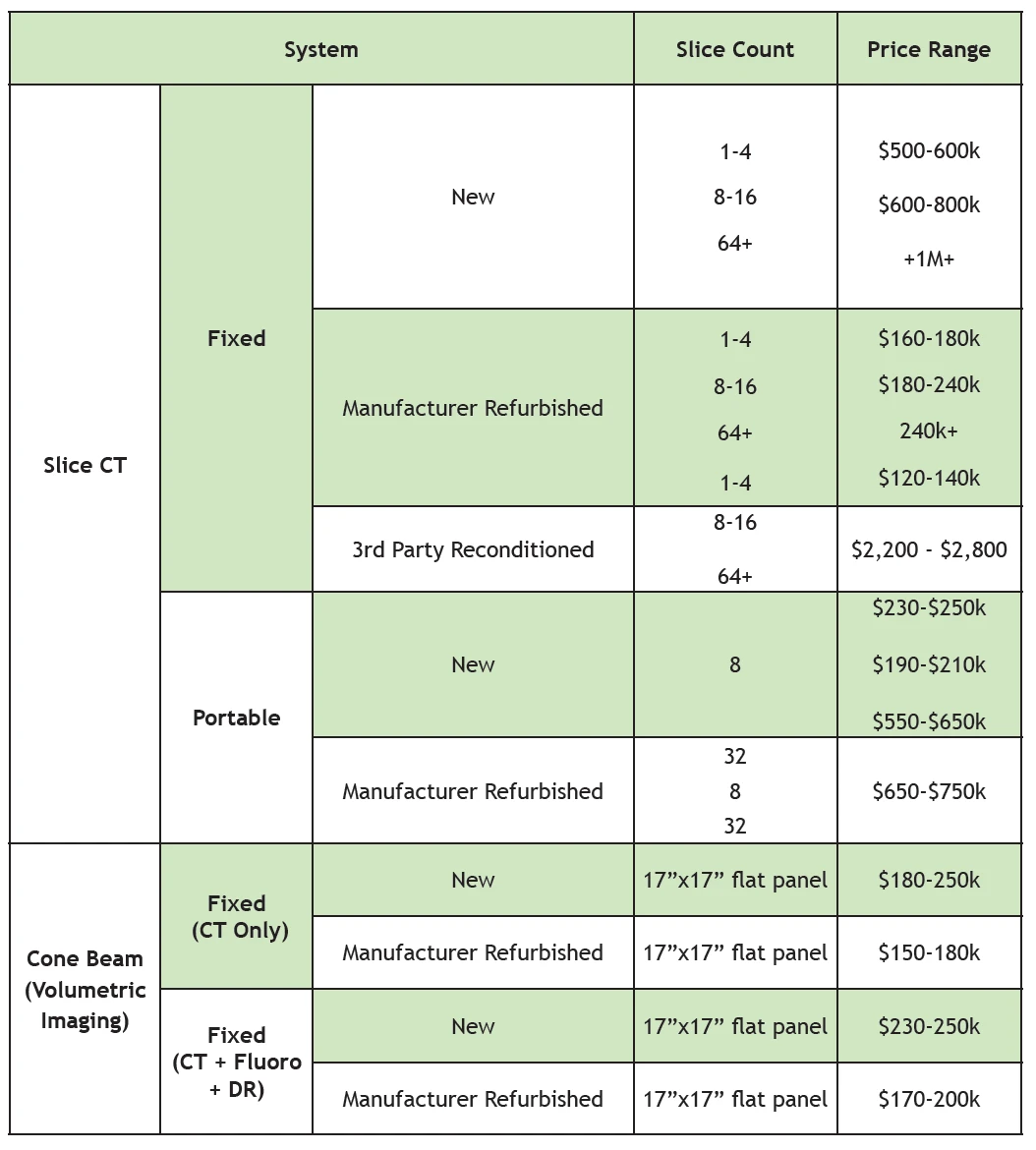It goes without saying that purchasing a CT scanner for your clinic is a major capital investment, but remember, it is an investment towards the level of care your practice offers its patients. Let’s take a close look at all the factors that contribute to the total cost of ownership, then you can start to calculate your potential income from CT. Some expenses are incurred before installation, other’s after installation. Here we’ll breakdown the costs associated with your investment according to the following factors:
Equipment (type of technology, fixed vs portable, new vs refurbished, and detector count)
- Space considerations
- Electrical costs
- Anesthesia
- Radiologist over-read
- Extended Service Contracts
Equipment
Your goal when purchasing a CT scanner is to find a system that meets the current and future needs of your practice in the most economical way. When you compare the options, you will find that the following four factors have the biggest influence on price:
The technology: Fan-Beam/Slice CT vs. Cone Beam/Flat Panel Volumetric Imaging)
- Whether the system is fixed or portable
- Whether the system is new, refurbished by the manufacturer, or reconditioned by athird-party company
- The slice count
The table below offers price ranges based on these four factors:

Space
For fixed CT scanners, the room requirements are on the order of 14 feet x 20 feet for the scan room and 14 feet x 8 feet for the control room. The cost of expansion or build-out for this varies greatly based on the need for HVAC, roofing, flooring, etc., but the range is about $80 to $400 per sq. ft. Finally, the scan room needs lead-lined drywall, which goes for about $5 to $10 per sq ft.
Electrical
For fixed CT scanners, the electrical requirements are often three-phase 480V, 150kVA transformers, with an installation cost of about $7,000 to $10,000—if it is in fact available in your area. You would have to speak to an electrical company to find out. In some areas, it is necessary to petition the city for rights to do this. For Cone Beam scanners, the requirement is a 220V line, which costs about $1,000 to install. Portable CT scanners work off batteries that charge via standard 110V (13A fuse) outlets.
Anesthesia
For Slice CT scanners, reversible sedation is often used during scans of the majority of the body. Because of the speed of acquisition (0.5-2 seconds per rotation), general anesthesia is often not necessary. One exception is during lung scans because the risk of motion artifact is slightly higher. The cost of this is typically relayed directly to pet owners as a line item on their bill.
For Cone Beam systems, general anesthesia is required for virtually all scans to prevent motion artifact from rendering the entire scan non-diagnostic. This is principally due to the longer acquisition times (15-30 seconds per rotation) during which any movement of the patient would require a re-scan.
Radiologist Over-Read
For orthopedic and even some neurologic cases, veterinary surgeons are often able to operate based on the standard reconstructions rendered by the CT acquisition/viewing software. However, for soft tissue pathologies and brain, lung, and abdominal conditions, a radiologist over-read is sometimes necessary. Depending on whether there is an in-house radiologist or a tele-radiology service used, and whether the need is urgent (STAT), the cost of an over-read ranges from $150 to $300 per scan.
Extended Service Warranty
Nearly all CT systems come with a one-year warranty. The price of an extended service warranty depends on:
- The risk involved in failure: warranties for new machines are generally less expensive than those for refurbished or reconditioned machines
- Who is offering the warranty:
- For new and manufacturer-refurbished systems, the warranty comes directly from the manufacturer
- For reconditioned systems: the warranty comes from the third-party company that sold you the system
In general, for Slice CT scanners, the extended service contracts range from $25,000 to $50,000 per year. For Cone Beam systems, the prices are generally lower: $8,000 to $15,000 per year.
SOUND® TOP TIP
Computed Tomography is an advanced imaging modality. There are advanced imaging specialists in your profession: they’re called Boarded Radiologists. DO NOT engage in the purchase of a CT scanner without first contacting your radiologist for their opinions.
Return on Investment (ROI)
With so many variables affecting the total cost of owning a CT system, it’s difficult to provide an accurate, one-size-fits-all ROI. Keep in mind that the median CT fee to pet owners is about $800 per scan, though it varies based on the use of anesthesia, work-up, and radiology over-read. It is also important to remember that the bulk of your income from CT will most likely come from increased surgical revenue (about $2,000 to $4,000 per procedure) and not just the fees for the scans themselves.
If you would like more information about the installation requirements associated with veterinary CT, call SOUND® at 800-268-5354. You can learn more about SOUND®’s CT systems by following these links >>> CereTom® CT | BodyTom® CT

